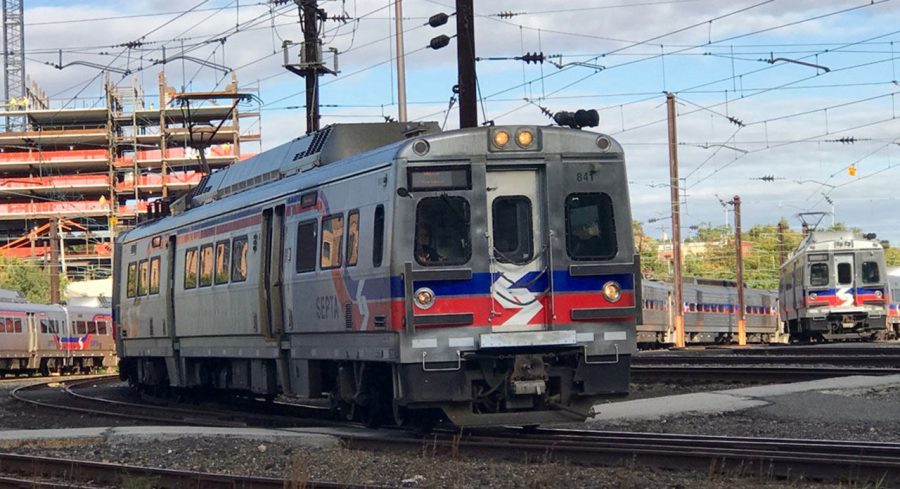Sexual Assault on SEPTA and Impact on Student Safety
Villanova students frequently use SEPTA to travel around Philadelphia.
October 27, 2021
On October 13th, on a SEPTA train traveling westbound on the Market-Frankford Line, a woman was sexually assaulted while riders watched and failed to intervene. Officials identified the perpetrator as Fistan Ngoy, who attempted to touch the woman a few times over the course of about 45 minutes before he became increasingly more aggressive. The aggressive assault lasted approximately eight minutes, and the reported 10 passengers in the train car failed to call 911, or physically intervene in the situation. The attack was eventually stopped by an off-duty transportation authority policeman, who got on the train and called 911. From there, a police officer arrived and took the man into custody. After the attack, the woman was taken to the hospital and worked with police officers to describe what had happened to her.
As a Villanova student who often rides the SEPTA, I have never experienced such harassment happening. However, as a young woman, I am not surprised at this recent attack. It is often unsafe for women to travel alone on public transportation due to the risk of cat-calling, trafficking, assault and other forms of violation. The treatment of this woman by Ngoy was extremely unacceptable and now creates a fear for women riding the SEPTA daily.
Ngoy, who is a 35 year old homeless man, was charged with rape, sexual assault and aggravated indecent assault without consent, among other crimes, according to court records. He was formerly arrested and convicted under at least three names in Washington D.C, Philadelphia and suburban Southeastern Pennsylvania for public intoxication, defecating or urinating in public, public disturbance and other charges. In 2017, while living in a homeless shelter in Washington D.C, he pleaded guilty to charges of misdemeanor sexual abuse; police report that he groped two women on the street. Ngoy is currently being held at Delaware County Prison on 10% of $180,000 bail and is working with a Delaware County Public Defender Attorney Mary Elizabeth Welch.
It is important to note that bystanders on the train recorded the attack but did not intervene could be criminally charged depending on the county district attorney office’s decision after the investigation. However, the spokeswoman for the Delaware County District Attorney’s Office, Margie McAboy, reported that, “It’s still an open investigation, but there is no expectation at this time that we will charge passengers.”
Agreeing with McAboy, superintendent of the Upper Darby Township Police Department, Mr. Bernhardt, admitted that Pennsylvania does not have a strong Good Samaritan law and that it would be very difficult to bring charges against those who witnessed the attack but did not intervene. Reflecting on the psychological and social aspects of the bystanders actions, Bernhardt said, “I’m appalled by those who did nothing to help this woman. Anybody that was on that train has to look in the mirror and ask why they didn’t intervene or why they didn’t do something.”
I believe Bernhardt’s statement accurately questions the morality of our modern society and criticizes the inaction of the people.
The bystander effect also comes into play, which is the psychological theory that individuals are less likely to offer help to a victim when there are other people present. I understand the psychological reasoning behind the hesitation to intervene. However, I believe that the struggle of this woman would have urged me to immediately intervene.
SEPTA reported that incidents of sexual assault are usually rare and that most crimes on the train observed are usually theft and robbery. Despite the rareness of sexual assault on SEPTA trains, that is it not to say it doesn’t happen and should not be looked out for. Society must understand that sexual assault is a major overlooked issue that causes lasting trauma for anyone affected, regardless of gender.
Villanova’s campus holds two SEPTA stops: one on West Campus and one on South Campus. Using SEPTA as a form of transportation is considered an easy and relatively inexpensive way for students, faculty and staff to leave campus and navigate Philadelphia and the greater Philadelphia area.
Many of my peers and I find ourselves taking advantage of the access to the SEPTA trains on campus. I have taken the train to go into Philadelphia, to go into surrounding towns like Ardmore and to go to and from the airport during break. The SEPTA is supposed to be a safe and reliable form of transportation, but instances of sexual assault and theft are always at risk as a young female traveling alone.
I firmly believe that these instances of discrimination and sexual assault towards women must end immediately. We must create an environment where women feel safe to travel by themselves and end the possibility of being sexually assaulted.


